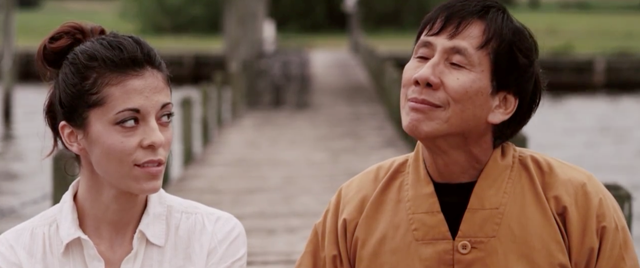By Montague Gammon III
The line from the locally produced, strikingly well lit and often quite beautifully photographed indie film Eyes of the Roshi that could become one of those oft repeated catch lines of popular utterance is “It’s a good one. I can tell.” (Like “Make my day,” with exactly the opposite of Dirty Harry’s attitude.)
The Asian hero of this martial arts, action/splatter- film, one apparently un-surnamed Adam, repeatedly makes that comment about items American benefactors give him, from a military surplus truck to a 6 string guitar, as he works his way into the society of a rural (North Carolina?) community.
Actually, the best line of the movie is something like “You have the badge, but I have the gun,” but that’s only said once.
According to Count Leo Tolstoy, all stories fell into one of two categories, and Tolstoy did know something about plotlines. Either someone goes on a quest (like Harry Potter or lots of sword-and-sorcery stuff) or a stranger comes to town (like Shane or lots of Westerns).
Roshi doubles up on the second type. Adam arrives in a Southern farming community, where he is followed by a murderous and clearly psychopathic pursuer named Carey.
(Carey has been set on Adam by a vengeful old enemy from Adam’s native Vietnam, but the film should tell its own story with minimal printed spoilers.)
Adam finds himself in the middle of some longstanding animosity that pits his new employers, farm owner Bonney Bright and his farm manager Tull Lambert, against a borderline mad, clearly wealthy and ostentatiously dressed neighbor, Hogan Dodd, who has in his employ or on his side a slew of low life offspring and would-be bullies, listed in the credits by first names plus the Dodd surname, or as “Dodd Gunner” and “Dodd Boy[s]” numbers 1-23.
Various other, often shadowy and ill-intentioned characters weave in and out of these parallel conflicts, which resolve in a nighttime battle between Adam and a slew of slow learning assailants and then in a rather tense, day-lit, isolated finale, an especially well done bit of cinematography involving a nice young lady of a slightly checkered past, Adam, Carey and an antique Schofield .44-40 revolver. (Roshi gets the guns right better than many low-budget narratives, but if one quite gratuitously racks the action of a pump shotgun and nothing pops out of the ejection port, one is monumentally lucky if no one has noticed ones monumental bluff.)
Along the way to the finale there is lots of blood, spraying from gunshot skulls – Carey wastes no ammo aiming elsewhere – and onto faces, walls, windshields and just generally all over.
There are also a host of lovely and lovingly detailed interior close ups which are something like the dynamic equivalent of still lifes, and a stunningly well composed, though fleetingly brief, tracking shot early on, of Carey walking by a sort of columned wall. There’s some serious filmic talent at work here.
Adam Nguyen, who really is a Grand Master of the Vietnamese martial art of Karate Do and of Raja Yoga, gives an appropriately low keyed, believable performance as the hero. (He’s also credited as Executive Producer, along with Richard S. Marten.
As Carey, Ethan Marten, the film’s producer and the President/CEO of the presenting organization, Light Age films, is remarkably and wisely understated (almost always). He and his brother Jonathan, who is also featured, were among the notably good and better than good stage actors in Hampton Roads for some years. Fourth Marten brother Seth makes a brief appearance as well.
As Hogan Dodd, Chris Van Cleave, who has also done lead roles on plenty of professional stages, shows lots of teeth in his emotive close ups, and puts numerous dental marks in the scenery.
Terrance Afer-Anderson, one of Norfolk’s most under-recognized truly fine actors, does nicely as the handyman of the Bright farm. (He’s one of many local performers, some easily recognized, some not, who appear in Roshi.)
The highest acting plaudits go to Mark Zilges and Newton Miller, as Bright and Lambert. Seemingly without effort, they give the impression of two men who have worked together in friendship and mutual respect for many years. It’s a subtle achievement, but no less impressive for that subtlety.
Jon Mark “Rusty” Nail directed, and certainly got the most out of the script that he co-wrote with Joseph Baum.
Eyes of the Roshi has no significant message nor does it attempt to be eternal art, but all-in-all, and especially as entertainment of its sort, well…it’s a pretty good one; I can tell.




